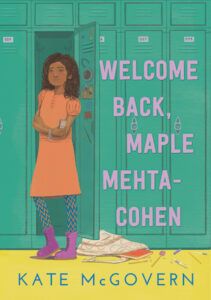
The Things I Learned During My First 9 Weeks as a School Librarian
A few years ago, when my best friend made the move from English teacher to librarian, she pulled me aside and said, “Girl, this is exactly where you belong. Get that endorsement.” I love teaching and wasn’t in a rush to leave the classroom. However, as a career switcher and coming to the classroom years after most of my colleagues, I didn’t think that teaching for 30 years was sustainable for me long term. Teaching in the classroom is physically and emotionally taxing. Begrudgingly, I signed up for yet more classes that I had to pay for out of pocket and started working toward getting a library media specialist endorsement on my teaching license.
I started this program thinking I’d be able to apply for an opening in five to ten years. There’s not high turnover in school library positions. Being who I am as a person, I plowed through the classes as fast as I could, taking some every semester and doubling up in the summer. As fate and the Lord would have it, a position opened and here I am. Hired in my dream job. Quarter one is done and here are some things I’ve learned so far.
There’s Time
In teaching, for me, there was always an ominous sense of urgency. I was always behind on something that was due yesterday that was sent out in one line of an email last week. What are we doing to help unmotivated students buy in? What about bubble kids, on the cusp of passing standardized tests but not quite there? Am I planning lessons that follow both state and county standards? Incorporating new tasks from my specialist? Keeping texts relevant and diverse? Did I collect, submit, and process the data I was asked for? Did I see the new attendance policy? When was that volleyball game I promised a student I’d go to? How many grades are due next week?? Give more. Do more. Be better. The kids need us.
As a teacher, there was never enough time. Once I had put out one fire and felt caught up in an area, I’d turn around to someone striking a match on a different deadline, another expectation. The furthest I could think about was that school year, if I was lucky. More likely it was thinking unit to unit and day to day.
As a librarian though, I get to think in terms of years. The freshmen entering the school this year will never know any other library than the one I curate and how I define the space. I get to think about these baby freshmen as seniors in four years and how I want them to feel about their school library.
Of course there are deadlines and expectations. Book orders and weeding goals. But the “Go! Go! Go!” and “Now! Now! Now!” has vanished. I came into this job this school year with urgency and self-made pressure. I would work diligently all day, then stop and think “What am I missing? What am I behind on?” and I wasn’t behind. I was right on schedule.
Plus, it takes time to change things. I can’t revamp what I want the collection to look like overnight. I can’t start new programming and have an unwilling audience that has to play along whether they want to or not, like I did when I was teaching. Now I’m building relationships over years, not quarters or semesters. I can undertake big multi-year projects, like genrefying and growing the book club and welcoming students that might not feel safe in other spaces in the school. I can completely change the vibe of the collection in four years. I can build community projects and connect with teachers. Being a resource to everyone who needs it.
Ask Questions
This seems obvious. But coming into the library as a lifelong library patron and former English teacher, I put pressure on myself to already know the ropes. Somehow, I thought I should intuit how to best run the space. Be preternaturally aware of the needs of my library and my students.
Luckily for me, librarians want to help people. The community of librarians I was hired into are an amazing hivemind who are not only willing, but enthusiastic to help me. We have a community page where we can ask wide ranging questions from “What was that book with the red cover and one person on the front?” to “Does anyone have an extra library cart?” I’ve visited other libraries in the county and had candid conversations about what are realistic goals to accomplish in a year.
Never once has my co-librarian, administrator, or a colleague ever belittled me or made me feel like a bother for asking a question. It’s almost as if *gasp* they enjoy helping people and answering questions.
Teacher Support
Initially as a school librarian, I thought students would be my primary focus. Turns out, teachers benefit from library support just as much. I get to work with teachers who want to talk through ideas, collaborate on research, and try something new. I’m able to use my research skills and literacy knowledge to create text sets that are diverse and relevant.
I get to take lesson planning, one of my favorite parts of teaching, and find resources I simply didn’t have time to find as a teacher. When I was teaching, I couldn’t spend hours looking for the exactly right short story to support the theme I was teaching and more often than not settled for good enough. Now the teachers I work with will have an extra brain helping them acquire texts and resources.
I’m Still an Educator
A fear I had leaving the classroom is that I was also losing part of my identity. I know all the Instagram therapists say that we are more than what we do to pay bills, but being a teacher was more than that. It was part of who I was as a person. It was something I was good at and that I loved doing.
Being a school librarian is all of the best parts of being a teacher. I get to lesson plan, connect with students, and teach. This crucial part of my identity remains intact, but transformed. It’s actually expanded. Now I am able to be creative in ways I couldn’t as a teacher because I didn’t have the mental or emotional bandwidth to give more than I was currently giving. There are opportunities to plan programming, work on teams outside the library, and help students every day. I was afraid I’d lose my connection to kids, but I haven’t. It’s just changed. And like I said, I have time to develop these relationships over time. There isn’t the pressure looming that sped up relationships in the classroom. Different doesn’t mean absent.
The first quarter in the library instead of the classroom has been a delight. There are many more questions I need to ask and relationships I need to establish. I’m learning something new every day. That’s not something I should be insecure about. Turns out, librarians are lifelong learners and encourage curiosity. They hope, just like I do, to turn their students into lifelong learners as well. Here’s to next quarter and all the quarters after, where questions will abound, and sometimes I might be able to find the answers.
Enjoy this? You’ll love There’s No Place Like Libraries and What Novel Set in a Library Should You Read Next?















